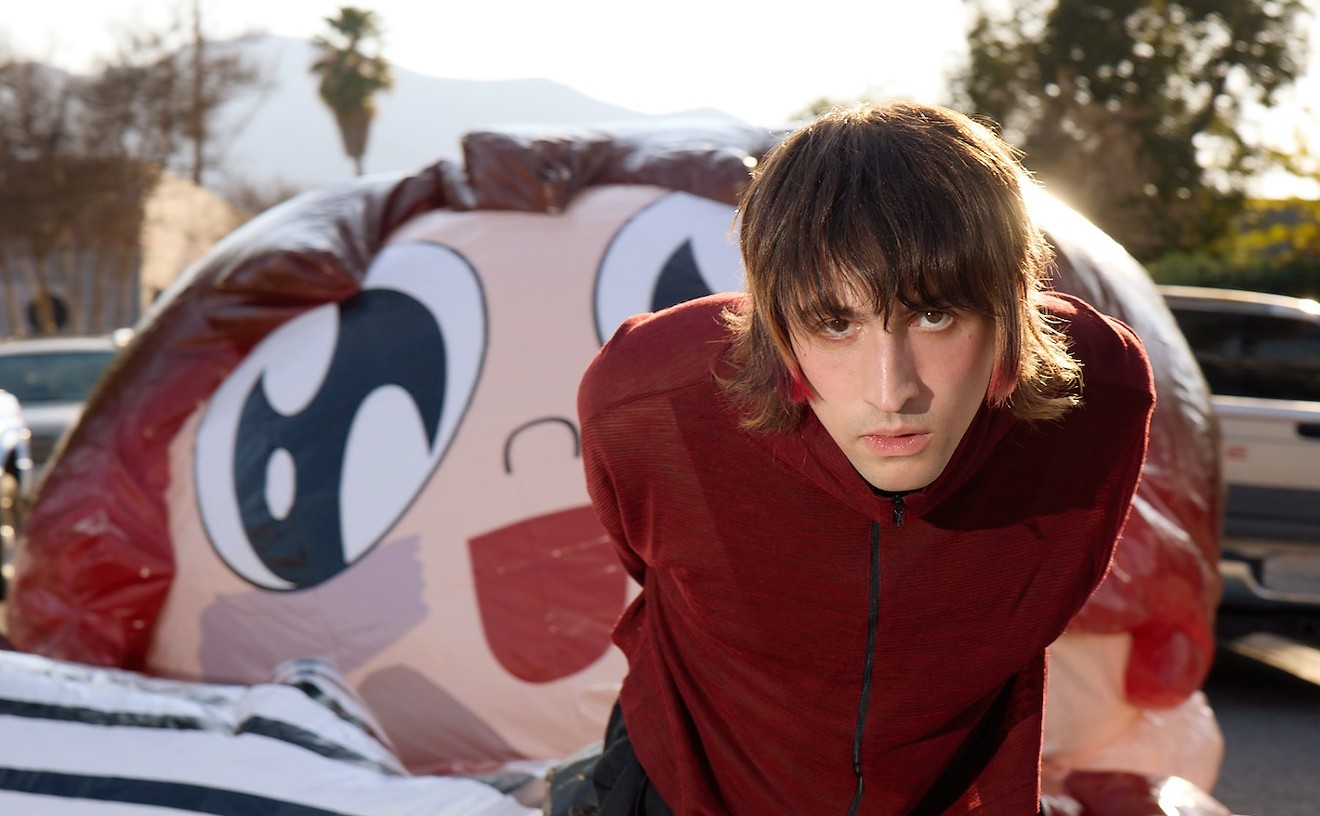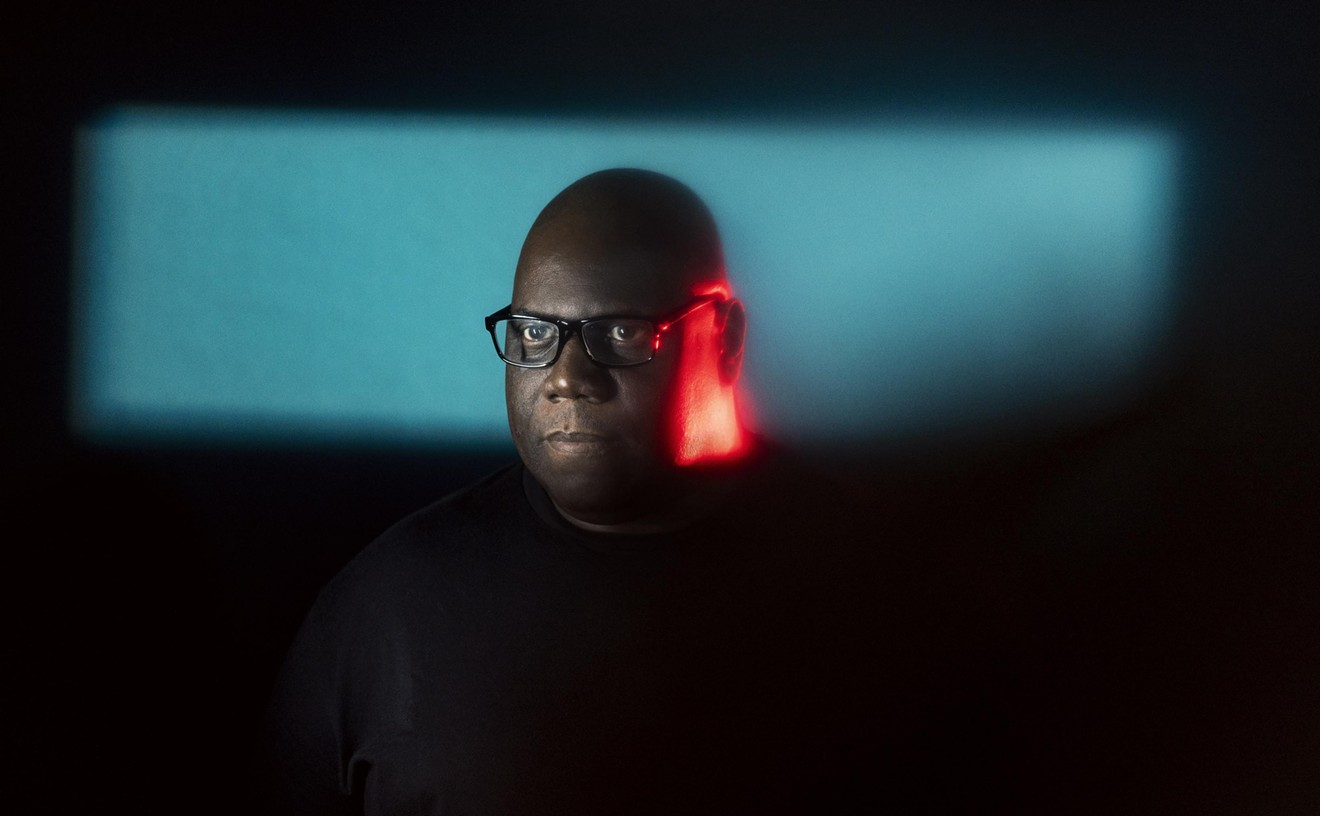The first thing you notice when meeting Chan Marshall, the songstress who performs under the moniker Cat Power, is that she is staggeringly beautiful — sinuous like a model, but shorter and slightly more compact, as if wired to spring forward. Her usually kohl-rimmed eyes are huge and round, darkly glittering and slightly watery, like those of a manga cartoon. When she's comfortable, she's often barefoot; her body language is louche, almost, well, feline.
The second thing you notice is her radiating warmth, a sort of heartbreaking generosity and maternal protectiveness of her nearest and dearest. She automatically proffers lighters to the compulsive chain smokers who seem to surround her ("Do you find that men do not light cigarettes?"). A Miami Beach resident for the past three years, she loves spontaneously inviting large groups to dinner at her favorite neighborhood haunts (especially Tap-Tap).
Then, of course, there's Marshall's voice. Raised in Georgia, she has a voice with the cadence of a Southern belle gone bad — hell can be drawn out to two syllables, dragged gently over a gravel bed. Her singing is bluesy, robust, slightly breathy, riding on or off notes as dictated by the demands of her sometimes painfully emotional lyrics.
She moved to New York at age 21 (she's now in her early/mid-thirties). Her first album for the superindie Matador Records, What Would the Community Think?, came out in 1996. And her star among the thinking set has been rising ever since. By last year's release of her seventh full-length record, The Greatest, she was appearing in big theaters like London's Barbican and large outdoor festivals like Coachella and Vegoose.
Backed by a 13-piece band of professional session musicians from Memphis, she toured behind the album for a year. Then she was ready for a simpler setup.
To that end, she formed a new band, Dirty Delta Blues. Each member boasts an impressive indie rock pedigree: There's Judah Bauer, formerly of the Jon Spencer Blues Explosion; Erik Paparazzi, of the Glass; and Jim White, of the Dirty Three. And on piano, organ, back-up vocals, tambourines, and handclaps is Gregg Foreman. Though he recently decamped to Brooklyn, the former frontman for the Nineties mod-rock band the Delta 72 lived for several years in Miami Beach; he's known around town for DJ gigs as "Mr. Pharmacist," at club nights like Back Door Bamby.
Last April, Marshall began work on her latest album, a collection of covers (her second) at the Hit Factory Studios in North Miami Beach. I met with her and Foreman there that week. They had recorded some 13 songs in three days in the famed main studio ("Come sit on the couch where Dylan sat," Foreman urged me).
When they would return to the States from a brief European tour in early summer, almost the entire thing would be re-recorded in Brooklyn. Then, in September, the month of the record's intended release date, there would be more last-minute sessions in Dallas. The record is now due out early next year.
But at Hit Factory, everything was relaxed. Marshall alternately stretched and curled up on her side and sat cross-legged, while her French bulldog, Mona, panted and sniffed by her side. Foreman sometimes plucked at an acoustic guitar custom-painted for Marshall by a graffiti artist friend; many times he finishes her sentences in a kind of ESP-driven back-and-forth.
New Times: Why did you decide to record the album here?
Marshall: Well, I really wanted to go to Mexico City, because I have some friends there and I thought it would be great to actually record live in a theater with an audience. That was my original idea. But because I'm so scatter-brained — I'm an air sign — I have a great memory of things that I want to do, but there's not enough time in my world to get everything I want done. So I just decided to do it here because I live here, and it was also a way for me to get Judah and Jim to come visit.
NT: So you're working with an engineer, Stuart Sikes, on these sessions. Do you usually work without a producer?
Marshall: I never want any help like that. I never have a producer. You can tell by listening to my records. Get an engineer who knows about vintage equipment and vintage microphones and you're pretty set.
Foreman: And a good room. The thing that's great about this is it's almost no overdubs. It's just live; we played, and that's the way it is. There are some things we touch up, but barely.
Marshall: It was all live. On every vocal track, if you turn up all the tracks, you can still hear every instrument on there.
NT: What was the main impetus for getting together the Dirty Delta Blues?
Marshall: When I did my last record, The Greatest, I knew that I wanted a great band. And I was afraid that people from Memphis who I gathered for that wouldn't be able to tour. I'd already thought of Jim and Judah. I had been wanting to play with Judah for like 12 years. But he'd always be like, "Nah, I don't think you're good enough, man."... And I still am not good enough and neither is he.... So anyways, when Judah was asking, do y'all want any other instrumentation, I said no, let's just have it a three-piece. Then Judah recommended Gregg, and we met around October of '06. I'd known of Delta 72 from years ago, and I had met Gregg before and knew he was nice.
NT: And when did you move to Miami?
Marshall: I've been coming here since about 10 years ago. I moved here a little over three years ago, but I hadn't ever had time off here. Like, every other month, I'd have four days here. So then when I got sober, I was just here, wham, for three months. And I really decided, "This is where I live. This isn't my vacation." Get off tour, and this is my home.
NT: Did you still have a place in New York then?
Marshall: I have my little squat kind of room that I've had since I moved there when I was 21.
NT: So when did you meet Gregg again?
Marshall: Was it at a club?
Foreman: Yeah, at Snatch, at Bamby. She came up to me. So we met again and she asked me to meet her at the Delano for lunch.
Marshall: He just told me [voice deepening and slowing, in imitation of Foreman's], He knows everything, man. About music, man.... And we got along so well.
Foreman: Yeah, at first I felt like it was an interview. I was naming my top keyboard players and stuff — and she's like, "It's not an interview. It's cool, man!"
NT: So was it a conscious decision to go with this more stripped-down sound? Or was it just a logistics thing?
Marshall: No, I wanted to make it easier.... Less tragic, I think. Because I think a lot of the songs we were playing live were just tragic ... depressing. Some of my songs are depressing, and with Judah and Gregg and Jim, we did a few of my songs from The Greatest record, but we started doing more covers, and it was a different kind of fun — less safe. And that led me to want to do a covers record.
Foreman: The good thing about her, though, is that she gives us freedom — not only live, but also to arrange things in our way.
Marshall: Unless it sounds like a tampon commercial.... I don't actually like tampons. And sometimes there'll be a certain sound that sounds like tampons.
Foreman: It sounds like Lifetime.... Like sometimes we'll come up with something that sounds too by-the-book, and she's like, "tampon commercial!" Like I did one song that she said sounded too much like Beck. Too pretty —
Marshall: Too clear.
Foreman: It wasn't fucked up enough.
Marshall: I like things to be kind of on a retard or on a slant. I love minor notes. I like doing covers because, um, I feel like there's less pressure on me to feel emotional. Like I can only feel supportive about doing a cover. I can only feel positive. The cover that I would choose is a song ... [that] is an inspirational strength. With my own songs, some of my lyrics might be really emotional, and I feel weird about repeating them, singing them every night. I think with covers, I can really abandon — I get to love the song, and that's it.
Foreman: But we might rewrite an entire song. Like the Billie Holiday song we did, I used the first chord that the song starts on, and then simplified it and changed it to her vibe. She would be singing it to me, and I'd be changing the chord. It was like an unspoken thing.
NT: How did you pick the ones you're working on right now?
Marshall: There's a lot I knew I wanted to do years ago. They just pop out, ones that you know. Almost like making a mixtape, where you have a crush on somebody in high school.
Foreman: Or sometimes she'll have made the mixtape, and it's ready to give to the person, and then we get a call and she's like, "What about this Otis Redding song?" And then we've gotta learn that one.... We all like the songs. But she's the captain of the ship, and we're just the crew members.
Marshall: They're my anger management team.
Foreman: I think Judah had a part in the selection too. It's like you have a president and the advisor to the president; he'd be the advisor. He'd be like, "No, I'm not doing that."
NT: What got vetoed?
Foreman: Oh, here's a perfect one. Pink Floyd, "Hey You." She wanted to do that, and all of us were like, "Hell no!" Jocks in our high school used to listen to that and try and fight us.
Marshall: I wanted to do "Stayin' Alive" [by the Bee Gees].
NT: So what's the procedure? How do you go about building up a cover the way you want it to work with the band?
Marshall: They just start playing something, and basically everything they do sounds great. And then maybe if it was too fast, we'd make it more slow.... I'm kind of a not very good loud, fast singer, so I guess that's why I always play slow and stuff.
Foreman: I always think the stuff she vetoes is more like, cheesy, after-school special —
Marshall: Perfect! I can't stand stuff that sounds inhuman and perfect. I like things to be open, have space, with an individualistic person playing with their own personalities. Like, if someone were there directing a tempo, I would want to screw it up. I would want to sing up on it or retard it, because the conformity of that drives me crazy.










